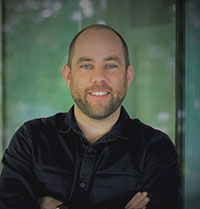 Colm O’Dwyer on doing, teaching, and sharing science in 2020
Colm O’Dwyer on doing, teaching, and sharing science in 2020
In our series, The ECS Community Adapts and Advances, University College Cork (UCC) Professor of Chemistry Colm O’Dwyer talks about how he, his students, and colleagues are managing research and coursework since Ireland shut down on March 11, 2020. Colm also directs the UCC Applied Nanoscience Group, focused on 3D battery printing, developing new sustainable battery materials, and real-time performance assessments using optics and photonics. Colm volunteers on the ECS Board of Directors, chairs the ECS Electronics and Photonics Division, and previously served on the ECS Interdisciplinary Science and Technology Subcommittee. Like many parents, he is homeschooling his young children while juggling other responsibilities.
Working where you live
“It is remarkable how students, researchers, and faculty coped with the dramatic changes, and switched to remote at lightning-fast speed. But it was much more difficult than we imagined. Predicting when I can be available without interruption is a bit of a lottery due to homeschooling. When I am available, I can’t assume that my students are; we have to coordinate in advance.
Normally, on campus I have an open-door policy. People still need to knock—loudly—because I always wear headphones. At home, I can create a super-comfortable work environment—especially with the headphones on. But I appreciate that…for others, focusing at home may be more difficult.”
New paths for research continuity
“People in my lab are at different stages in their careers. The postdocs are very experienced and have been collaborating for a year or two. While the lab has been shut, they have been ‘squeezing all the juice’ from data already collected. All my PhD students are first year, which is always challenging, but this is truly unprecedented. We have never been forced out of our labs before. We’re all aching to get back in—it is what we enjoy most.
Since June 22, we have been in a phased reopening period with the lab open for critical research. We are making the labs compliant with safety and social distancing guidelines. It feels post-apocalyptic to do our research together, while physically avoiding each other! Strange, but we are going to have to make this work for the foreseeable future. We have to accept that we’re not going to be as productive as we would like.
As an alternative to lab experiments, our PhD students are focusing on literature review. Reading paper after paper can be overwhelming. They each wrote a mini-review article on topics that help the team. This creates a good writing opportunity, lessens the load across the team, and helps students focus on areas for possible experiments…A number of them are making plans for writing proposals and papers, and doing research when we get back to the lab. Others are finalizing their theses.”
Teaching and learning, online and in place
“A formal decision on the fall semester should be announced soon. It’s likely to be mostly online. First-year students may have small tutorials and labs groups to provide some university experience. As the fall is a heavier teaching load for me…I can use the summer to get material recorded and prepare for a better experience than we could offer in haste this spring.
UCC (created) a lot of thoughtful resources with the Keep Teaching and Keep Learning websites—but it’s still…tough. Even with pedagogical, IT, management, and various supports…it falls on individual instructors to manage their courses in a way that is new. Even if everything goes smoothly…it’s hard to engage with all aspects of teaching and research remotely, without any real interaction.”
Volunteer to lead
“I was a fledgling PhD student when I went to my first ECS meeting. It was my first trip to the US. I felt like a duck out of water, surrounded by such accomplished people. Within minutes, someone who had written like 100 papers that I had read, turned around to shake my hand and ask about my background and interests. People were so welcoming. I didn’t encounter any of the hierarchical barriers I had imagined. There I was, having coffee with the people I thought would be unapproachable.
Nothing can replace the personal interaction. Conferences are much more than presenting research. People involved in ECS make it their business to talk to people. That led me to get involved early in my career. Volunteering helps me meet a lot of interesting people whose work I follow. We collaborate to advance the science and give back to our community. I appreciate attending meetings even more now, knowing how many hours and ideas people contribute to make them happen.”
Into the future
“The longer COVID-19 lasts, the more we need to innovate. We will have to make cultural changes about how we disseminate research, hold meetings, and engage as a community. ‘Zoominars’ blossomed at the beginning. They’re interesting when they’re focused and small enough that people get a chance to participate and contribute. But with so many options, it can be overwhelming—more so than selecting which sessions to attend at a conference. Scientific conferences mimicking Netflix (a ‘conference TV’ network) are interesting, but I’m not sure they will work. When we’re spending all of our time engaging online (through Zoom or Teams), more of the same might not be the optimum solution for networking.
Yet, conferences could take new shapes. Funders could support big ticket attractions—societies could come together for blockbuster online events engaging people across the career arc. Some student chapters have taken leadership, by starting journal clubs, inviting people to informal, partly-scientific talks by luminaries, or asking their scientific heroes to ‘visit’ their groups. I can imagine ‘world tours,’ with guest speakers linking to student chapter locations across the world. There are really a lot of possibilities for something fresh and interesting!”


